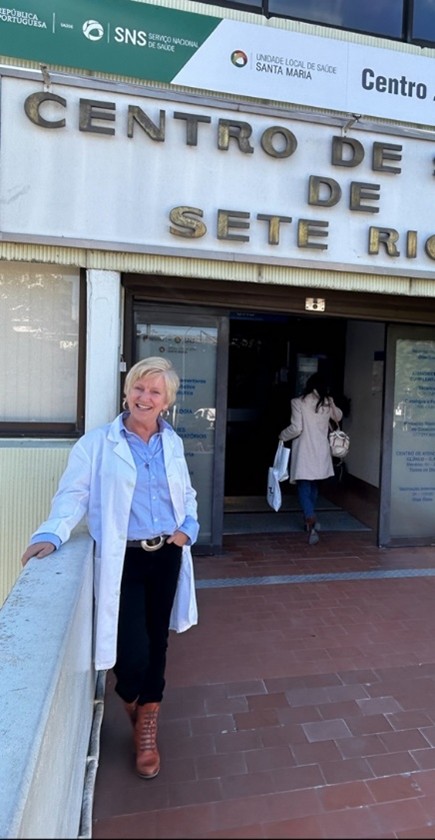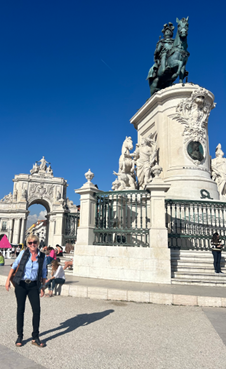Continue reading MPH Alumni, Susana Hubbard's story!
 Journal of time in placement
Journal of time in placement
It has been four years since I began working toward my Master of Public Health (MPH) while simultaneously working full-time as a registered midwife in Kingston. Balancing these dual responsibilities presented numerous challenges, particularly as I navigated the demands of both my academic coursework and professional commitments. I am certain many “mature” flex students can relate to my experience. Throughout this journey, I have been fortunate to receive support from exceptional professors. Dr. Helle Moller consistently offered guidance and encouragement, while Mr. Bruce Weaver's expertise and availability were indispensable in helping me succeed—better said, in helping me earn a 'pass' in Biostatistics. I am also grateful to the administrative staff, whose patience and understanding were invaluable, especially when I struggled with finding a practicum overseas and course registration challenges.
For my practicum, I sought a placement that would offer both an engaging and intellectually stimulating experience in a cultural setting outside of Canada. After seeking opportunities in various countries, I was fortunate to connect with Dr. Gonçalo Augusto in Portugal, whose global perspective, passion for healthcare reforms, and kindness made him an ideal field supervisor. He graciously agreed to supervise my practicum and support me in completing my MPH. The placement itself presents an exciting opportunity to apply my academic knowledge in a new cultural context.
I am grateful to have this opportunity to work within a public healthcare system that, in many respects, is still in its developmental stages. Following the revolution of 1974 and the subsequent end of Salazar's dictatorship, the newly established government aimed to create a more equitable public healthcare system. This led to the founding of the National Health Service (Serviço Nacional de Saúde, SNS) in 1979, with the goal of providing universal and free access to healthcare for all citizens. This shift marked a transition towards a public health model focused on preventive care, health promotion, and community-based services.
The Local Health Units (LHUs), a key component of Portugal's National Health Service, offer a wide range of services that share similarities with the public health units in Canada. Both provide essential public health functions such as health promotion, disease prevention, and community-based health education. However, one notable difference is that LHUs also function as primary care centers, delivering general medical services that go beyond the typical focus of Canadian public health units. In addition to public health initiatives, LHUs provide a variety of primary healthcare services, including prenatal care, pediatric care, general medicine clinics, and pharmacy services. This dual role of offering both preventive public health services and direct medical care reflects the broader scope of primary healthcare needs in Portugal, compared to the more specialized focus on public health programming seen in Canadian public health units. Overall, the SNS is designed to ensure that all residents have access to essential health services while promoting public health and well-being.
Although I am tempted to slip down to the Health Unit’s prenatal clinic and use my midwifery skills, my work here has been focused exclusively on public healthcare programs and services.
Under the supervision of Dr. Gonçalo, I am working at the Centro de Saude de Sete Rios (Seven Rivers Health Centre), located in a suburb of Lisbon. My daily commute, which lasts an hour and a half on public transit, offers a unique opportunity to observe a diverse cross-section of Lisbon’s population. I find myself reflecting on the varying ethnicities, querying the range of socio-economic backgrounds, and observing signs of stress or well-being amongst my fellow commuters. Although these observations are not directly part of my deliverable, they are valuable when considering how North Lisbon could benefit from a new, innovative health plan that addresses the social determinants of health within the region.
T his past year, the Serviço Nacional de Saúde (SNS) has embarked on a process of reforming local health units (LHUs) and unifying management structures, with the aim of improving care coordination. Considering these changes, my deliverable is to review current data, assess the previous health plan for this region, and develop a new, innovative Health Plan for the LHU, “North Lisbon”. A bit daunting!
his past year, the Serviço Nacional de Saúde (SNS) has embarked on a process of reforming local health units (LHUs) and unifying management structures, with the aim of improving care coordination. Considering these changes, my deliverable is to review current data, assess the previous health plan for this region, and develop a new, innovative Health Plan for the LHU, “North Lisbon”. A bit daunting!
My main challenge has been staying focused on my deliverable while simultaneously engaging in hands-on public health work with the technicians here at Sete Rios. The public health work I’ve had the privilege of participating in has been incredibly interesting and diverse. I work alongside public health technicians on a weekly basis collecting mosquito eggs to monitor the potential threat of dengue. This work has taken me to locations—alleyways, beneath trees in local parks, dark corners in museums, and parking lots at police departments—places that most tourists in Portugal will likely never see, all in the name of mosquito egg collection.
Additionally, I have joined public health technicians on inspections of various facilities, including senior care homes (both private and public), schools, and daycare centers. These inspections are a crucial part of their work, and much like my morning commute on public transit, each inspection has been a fascinating learning experience. I have also visited homes and apartments to assess the welfare of pets following complaints of animal abuse, which has further highlighted the broad scope of public health responsibilities here. It seems that public health in Portugal encompasses nearly every aspect of health, which has made my time here both engaging and dynamic.
I work at the Health Centre Monday through Friday, from 9 a.m. to 4 p.m., unless there’s a strike in the public healthcare system, a public transit strike, a national holiday, or the threat of torrential rain—all of which are common occurrences. When these situations arise, I take the opportunity to work from home on my deliverable. In addition to my work at the Health Centre, I have been collaborating with Dr. Gonçalo on the reform of the Public Health Program (both Bachelor’s and Master’s) at NOVA University, where he lectures. Dr. Gonçalo is deeply committed to driving reform at both the academic and service levels, with the goal of ensuring healthcare reforms that promote health equity for all citizens of Portugal.
I am thrilled with my placement and, it’s not all work! I live in Cascais, a coastal town just outside of Lisbon. I spend my weekends exploring different parts of this beautiful country or visiting old friends in the Algarve, where we lived when our children were younger. One evening this week, as I walked past Lisbon's Praça do Comércio on my way to the metro—following some pickleball after work—I paused and thought to myself, 'How incredibly fortunate am I?”. Then I boarded a train, watched the sunset over the ocean, and arrived home to a fresh fish dinner at the wee café below my flat.
- Susana Hubbard, Master of Public Health, 2025
Continue reading MPH Alumni, Dr Melinda Roberts Noel's journey!

At Lakehead, under the supervision of Dr. Wiersma, I completed my inquiry regarding whether an established self-management program would support care partners of those living with dementia. At this time, I had advanced my career to become the Executive Director of Health Services for Central Health in NL, and I was seeing first-hand the burden of being the “second victim” of spouses and other care partners caring for those living with dementia. Dr. Wiersma sparked within me the idea that public health programs can be expanded to support care partners who indeed are living with the burden equivalent to or more than other more accepted chronic diseases. With many thanks to Dr. Wiersma, as part of my MPH program at LU, I completed the research, and successfully defended my thesis, “Understanding the meanings of the lived experiences of spousal care partners participating in a chronic disease self-management program”. In my practicum, I developed a navigational tool highlighting supports in our RHA called “Dementia? – A guide to help you navigate the system”. It was this learning experience and the strong research foundation at Lakehead that strengthened my application and helped me gain acceptance to medical school.
In 2015, with this new Masters degree in hand from LU, at the age of 42, I started again the process of medical school applications. First, I was accepted to Monash medical school in Australia to their rural medicine program. However due to some issues with immigration documents after moving to Australia, I was unable to start their program. I then began the process to attend a Caribbean medical school - American University of the Caribbean in St. Maarten. After only being there for 3 glorious days, we had to flee ahead of hurricane Irma on the last flight off the island. The school took a direct hit and was partially destroyed from the 300KPH winds, and this option was destroyed. A few weeks later, I departed for Northwest England as AUC was able to set up their medical school there due to a partnership they had with UCLAN. While there for only a few weeks, I received news that I had earned an interview with MUN medicine program at home in NL. Shortly after, I received news that I had gained acceptance to MUN medicine program, and I began the program there in 2018.
After this tortuous journey of acceptance to medical school, I began the intense study to become a medical doctor. After many days and nights of study, at the age of 48, this month I had the honor of walking across the stage at MUN medicine convocation to receive my Doctorate of medicine. Currently, I am just starting my family medicine residency with MUN medicine in Western NL.
When I asked aloud at age 42, ‘Should I continue to pursue medical school now?’, my husband, Brad, quoted Earl Nightingale: ‘Never give up on a dream because of the time it will take to accomplish it. The time will pass anyway.’ He said, ‘you will either be 48 and working in your current job, or you can be 48 and be a family physician’.
As a proud alumni of Lakehead university, I can surely say that the MPH program and my research there played a large role in my culmination of graduating with my MD. My dream has become a reality. I look forward to serving older adults in a rural community as a family physician for many years to come! Thank you to Dr. Wiersma for her support and the continued supervision of my research during medical school. The professors at LU have proven to be continued supporters of my academic pursuits to fulfil my life calling – to become a family physician.
Forever grateful and ever blessed!"
- Dr. Melinda Roberts Noel, Master of Public Health (Thesis Stream), 2015

